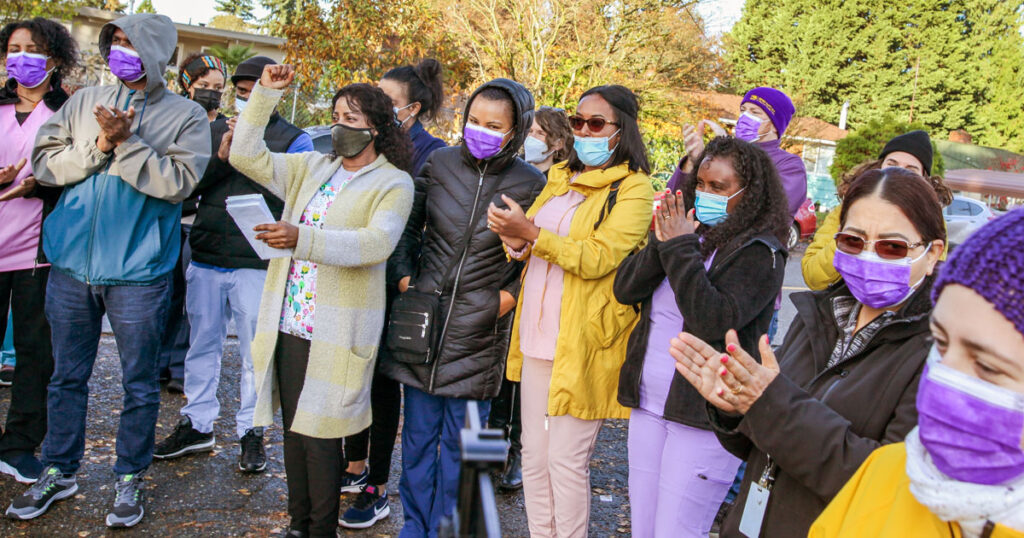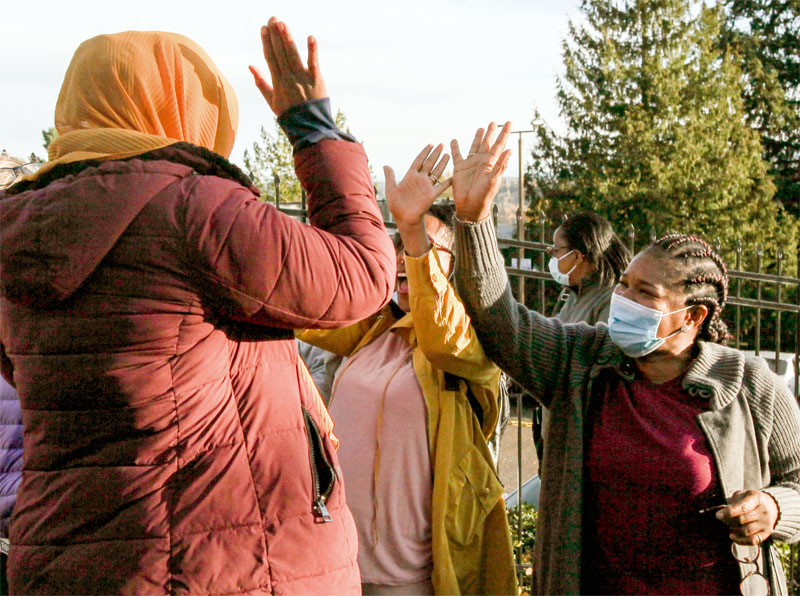After 3½ month strike, Cascade Behavioral Health workers in Tukwila overwhelmingly ratify deal to improve safety and wages
David Groves for The Stand
TUKWILA, Wash. (Nov. 11, 2021) — In a watershed moment for workers in the behavioral health industry, nurses, mental health technicians, and support staff represented by SEIU Healthcare 1199NW at Cascade Behavioral Health voted overwhelmingly on Wednesday to ratify collective bargaining agreements that raise the bar on quality care, and patient and worker safety standards. The win follows a courageous 3½ month safety strike by the brave and dedicated caregivers, who were spurred to action after a violent incident at the hospital left nearly a dozen staff members injured. They walked off the job 15 weeks ago demanding dedicated security staff to keep patients and workers safe.

“This is a huge victory for patients and caregivers at Cascade and behavioral health facilities nationwide,” said Hawah Aminzason, Mental Health Tech. “Across the country, patient safety and worker safety are being put in serious jeopardy to boost shareholder profits. Our unity and courage have sent a strong message that it’s time to fix for-profit behavioral healthcare, starting with Acadia Healthcare.”
The historic agreement is poised to be a model for behavioral healthcare workers nationwide. The landmark provisions include:
- Five dedicated safety techs who are trained in de-escalation techniques, support trauma-informed care, and can respond to emergency situations on both day and night shifts;
- Industry-leading safe staffing ratios for all units and patient placement guidelines;
- Guidelines that charge nurses will not have patient assignments, and “sitter” assignments will be made in addition to Registered Nurse and Mental Health Tech staffing;
- 15% raises over the three-year agreement and return to work bonuses;
- A mediated process to address hurtful and discriminatory behavior and discuss equity and racial justice;
- An agreement on COVID safety, including the testing and notice staff need to work safely.

The agreements at the 137-bed facility cover 220 workers in three units: RNs/LPNs, mental health techs, and service workers.
“Acadia’s business model is broken,” said Jane Hopkins, Executive Vice President of SEIU Healthcare 1199NW. “It relies on dangerous under-staffing that puts patients and caregivers in harm’s way. With this historic victory we’re proving that we can change the way Acadia does business, and we intend to do exactly that.”
“This agreement is a big win for my patients and my community,” said Lidia Abushet, Licensed Practical Nurse (LPN). “Everyone was behind our efforts, because they agreed that caregivers and patients deserve a safe environment to work and recover. We rejected Cascade’s for-profit cost-cutting and stuck together to guarantee workplace safety. I’m looking forward to returning to my patients and providing excellent care in a safer environment.”
Workers began their safety strike not only in response to the Aug. 1 incident with a volatile patient but also ongoing, unchecked workplace violence, chronic understaffing, racism, and deficient COVID-19 protections. For three months, hundreds of Cascade employees held a lively picket line calling for their demands to be met and were joined by elected officials as well as faith leaders and other community supporters.
“We have won the most amazing contract with increased standards not just for workers and their children and families, but for the rest of the nation,” said Diane Sosne, president of SEIU Healthcare 1199NW. “Through their courage and unity, workers at Cascade have set a very high bar and launched a movement, and we’re taking this fight nationally.”

“For the last three and a half months, I want you all to know that you have inspired our labor movement all across the state of Washington,” April Sims, Secretary Treasurer of the Washington State Labor Council, AFL-CIO, said at Monday morning’s rally with Cascade workers before their 9 a.m. return to work officially ended the strike. “More than half a million workers have been watching your fight, watching you stand strong, and being inspired by your solidarity, by your clarity and your strength. It is because you guys stood shoulder-to-shoulder, holding the line. You knew your worth. You knew your value. And you didn’t back down.”
In October, a delegation of strikers took their demands to the streets of Washington, D.C., where they confronted parent company Acadia Healthcare’s CEO Debbie Osteen and other corporate executives at a national behavioral healthcare conference.
Most of the SEIU Healthcare 1199NW caregivers at Cascade are women, many of whom are immigrants and workers of color. They won provisions that will not only make Cascade safer for themselves and their patients, but also ways to ensure safe staffing and address racism inside their facility.
